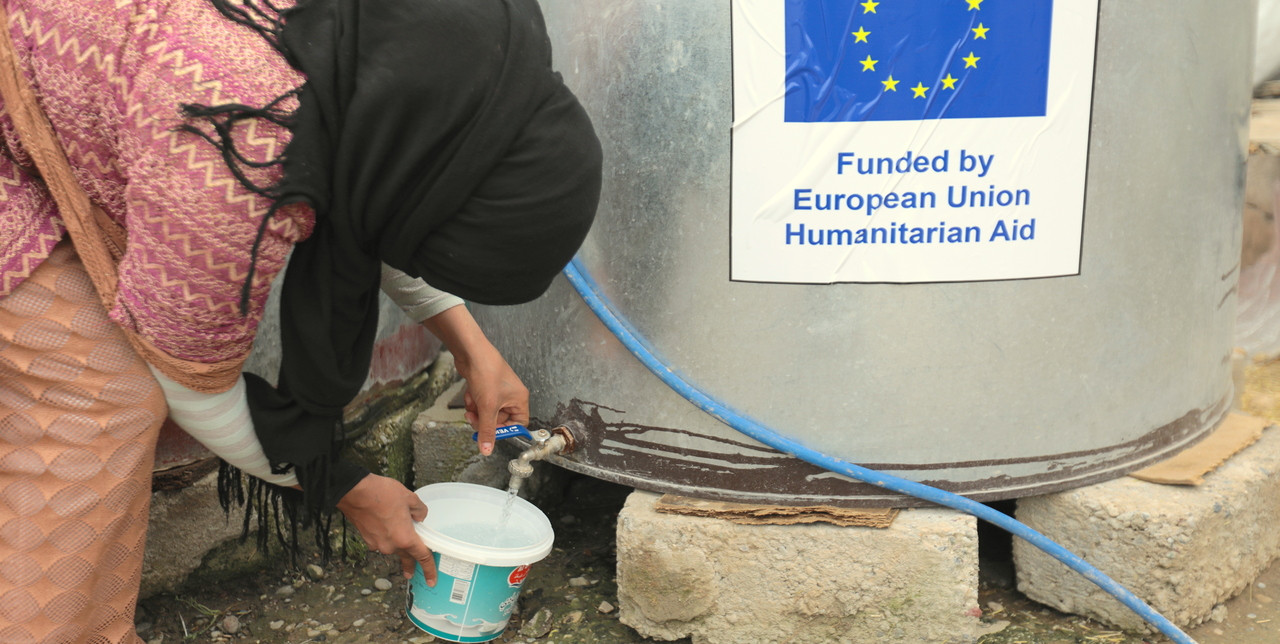29-03-2022 | di COOPI
Iraq. On line the exhibition about water access
“Access to water services for conflict-affected populations in Iraq” is the title of the photo-exhibition co-organized by COOPI – Cooperazione Internazionale, Solidarités International and SEDO (Sahara Economic Development), from March 28th to April 28th, at the French Institute -52V2+55R, Erbil, in the framework of 2022 World Water Day, thanks to the financial support of European Humanitarian Aid and the facilitation provided by the French Institute and the French Consulate in Iraq. The exhibition is also available on line.
In March, the photographers Omar Adil and Mohammed Ali traveled to Fallujah and Mosul districts to meet with families and individuals willing to share their stories and their space. This exhibition is built around 4 thematics: Access to water; Sanitation; Hygiene promotion and Shelter rehabilitations. Through this lens, you will discover the uncomfortable truth of what life can look like for the half a million people living in informal settlements in Iraq and how NGOs are trying to support them.
Since the end of the fighting against the Islamic State late 2017, the Iraqi context gradually shifted from a high intensity armed conflict to a post-conflict era marked by the progressive return of displaced populations.
However, populations unable to go back to their communities - because of destruction, a lack of available services or remaining security constraints - and people who were confronted with the camp closures in federal Iraq, find themselves in particularly vulnerable situations. Today, over half a million people live in informal settlements, facing immense challenges to meet their basic needs. Political and social tensions have continued through 2020 and 2021 destabilizing the country, limiting access to support services and diminishing displaced populations' perspectives of a final return. Moreover, the country was not spared by the Covid-19 pandemic, with more than 500,000 recorded cases and 11,000 deaths, particularly impacting the most vulnerable populations.
In order to provide assistance to the people facing the most dire living conditions, COOPI - Cooperazione Internazionale, Solidarités International (SI) and Sahara Economic Development (SEDO) created a consortium to design and implement the ECHO-funded project “Provision of essential services to multi-displaced populations living in under-served areas through WASH and Shelter in Iraq”.
Through this project, the partners have supported 33,731 people in the governorates of Baghdad, Anbar, Ninewa, Kirkuk and Salah al Din. Based on the expertise of the organizations, the activities implemented were centered around one main axes: access to Water, Sanitation and Hygiene. In order to also address the critical shelter needs of the project participants and in order to employ a comprehensive assistance approach, the partners also conducted basic shelter rehabilitations.
In order to highlight the difficult living circumstances of these mostly multi-displaced families and to cast light on their plight for safe and dignified futures in places they can call homes, the consortium present this photo exhibition.
The photographers’ bios:
Omar Adil is a photographer from Baghdad. Graduated with a Bachelor in Optical Techniques, he has followed several courses in Conflict sensitive reporting and protection principles. Since then, he has been working as a freelancer photographer. He has worked for Our Voice Organization, the Arab Academy for Human Rights as well as for several channels and networks.
Mohammed Ali is a photographer from Kirkuk. He was trained at the Kirkuk fine arts institute. He's been as a freelance photojournalist since 2013, covering stories of displaced people and victims of the war against ISIS. He has worked with the World Health Organization (WHO) and the Food and Agriculture Organization of the United Nations (UNFAO) to cover some of their activities.
About European Humanitarian Aid:
The European Union and its Member States are the world's leading donor of humanitarian aid. Relief assistance is an expression of European solidarity with people in need all around the world. It aims to save lives, prevent and alleviate human suffering, and safeguard the integrity and human dignity of populations affected by natural disasters and man-made crises.
Through its Civil Protection and Humanitarian Aid Operations department, the European Union helps millions of victims of conflict and disasters every year. With headquarters in Brussels and a global network of field offices, the EU provides assistance to the most vulnerable people on the basis of humanitarian needs.




 Iraq
Iraq